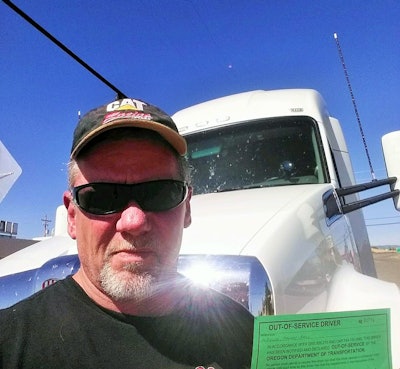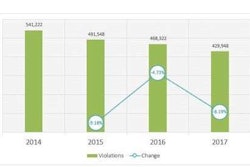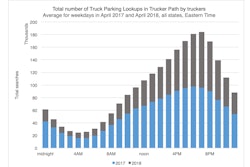The Federal Motor Carrier Safety Administration stressed in advance of the ELD mandate that it was in turn stressing to state inspectors that, in situations where drivers were forced into recording hours of service violations with their ELDs by circumstances on the road reasonably beyond their control, drivers were being advised to log it all like it happened, clearly annotating the log in the ELD to explain the violation.
In the words of some of my reporting from just after the ELD mandate’s inception, describing regulators’ messages to drivers in advance of the mandate:
What advice the federal government and some state officials have given for circumstances such as those … – log it like it happened, annotate the log to describe the circumstances, and hope for leniency if it’s questioned – is inadequate to address drivers’ appropriate concerns. Hours-compliance records … now are more dependent on the whims of shippers and receivers, port/railyard operators, parking availability, the understanding (or not so understanding) nature of individual inspectors and so much more. While the anti-coercion rule gives drivers an avenue to blow the whistle on shippers, brokers and carriers that would threaten economic harm for their refusal to violate a regulation, otherwise nothing has changed about hours of service.
 Tom Werner came to trucking after years in construction in the Carolinas.
Tom Werner came to trucking after years in construction in the Carolinas.Werner goes “to California a couple times a week” from his home base in Molalla, and was headed southbound on I-5 nearing a location where the speed limit is 60 for trucks and he says is “famous” for patrolmen to be “hanging out down by the truck stop coming down off the mountain.” It’s not far ahead of the last Oregon rest area before you get to the California border, where he was planning a stop.

“I came over the hill and over the other side, and I saw him,” Werner says, referring to an officer staked out by the road. “I was going a little quick.” When he was followed into the rest area by the officer, “I told him I was reading 68 mph, and he said he had me at 70.”
Ultimately, the officer finished with the speeding ticket and asked if Werner had an electronic log. He asked the hauler to hand it to him, but it’s a dash-mounted eRoad-manufactured device. “He said he’d never done one,” Werner says, not yet run through an e-log with a driver, as Werner took him to mean.
I contacted the Oregon State Police for their comment on the stop but officials did not get back to me in time for this report. Werner has been in touch with the officer’s Sergeant as well, hoping to reverse the mark on his record, to no avail as of press time, he says.
Werner, who’s emailed logs from the devices directly to officers before, offered to give the officer a run through how it worked, though in some ways Werner himself is still getting used to the device, having run it only for a month or so.
“He gets on the running board,” Werner says, and the owner-operator explains a few of the screens on the device, including the prior days’ history pages, the page that shows the basic graph page, pages showing the location data for the truck. “I showed him the remarks area when you have an issue,” the area where drivers can input annotations to status changes that FMCSA harped upon in advance of the mandate to explain status changes and special cases.
Werner had an example of that for the officer, looking back to the previous Sunday, when he got to Sacramento that evening, stopped to go off-duty and “was talking another driver” at the location, Werner says. He’d forgotten to log off-duty for the entire 11 hours he spent there, sleeping overnight for most of it. He showed the officer the location data for that status as well as his remark to the effect that he’d made a simple mistake — location data backed up the remark, of course, showing no movement of the truck through it all.
In retrospect, Werner notes, he could have gone back and better edited that status to reflect the reality of what happened there, then annotated the status with a remark to that effect. Critically, however, he hadn’t done that as yet. Monday morning, when he’d realized his mistake, he simply made a remark within the log that the 11 hours on-duty not driving was in error, but he didn’t change the log itself.
Through the roadside encounter with the officer the following Thursday, Werner says, the officer is nodding along and taking things in. At this point, “he’s in the truck with me, kind of agreeing,” nodding along with Werner’s tour through the device. Then, the officer got out and asked Werner, “So, where do you want to stay?”
As Werner tells it, “He’d decided he was going to shut me down. I said, ‘Man, come on.'”
Things turned for the worse thereafter. “I was tired of messing with him,” Werner says, and went ahead and did as usual and emailed his full log to the officer, which showed a cumulative 73 hours on duty, 3 beyond his limit, but including the erroneous 11 hours from Sunday night to Monday morning.
“All I have to go on is your log,” the officer repeated numerous times as Werner made his case for leniency. “I said, ‘You’re really going to shut me down? … Isn’t it your job as a state trooper to use common sense and judgment?'” The trooper, he said, had even called Werner’s failure to move the log to off-duty an “honest mistake,” he says, while in the truck with him.
After a police escort back up I-5 to a nearby truck stop for his forced 10 hours off-duty, the owner-operator told the officer, “I’m going to fight this. He said, ‘What do you mean? I didn’t give you a ticket'” for the log violation.
“There no reason for you to shut me down,” Werner emphasized, then stressing how the violation will count against his carrier’s points and will appear on his own Pre-Employment Screening Program record as a driver. “I just sat there in my truck that night for 10 hours,” stewing over “just what I’m sitting there for.
“I had nothing to hide, and was up front with him about it.”
So much for leniency.











